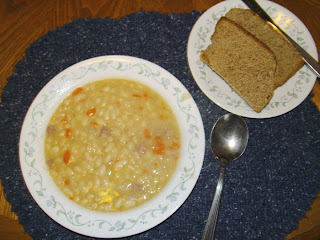
New Year is past; each day grows imperceptibly longer now. December was the most frigid I can recall and now that we are back to average January temperatures it feels like a spring thaw. Perhaps Old Man Winter has worn himself out or there is no more cold air on the pole or in Canada to slide down into the 48. I can hope. It did get up into the 40s today and was sunny so I worked half a day pruning fruit trees. I probably lopped off more than I should have but the increased roots to branches ratio may help the trees if there is a drought next summer. If given the choice between doing exercises or doing outdoor work on a cold but sunny day I prefer to do yard work because I can see something accomplished afterward.
After the over indulgences of the holidays I am ready for the inexpensive and simple fare of winter. We eat a lot of hot oatmeal with butter, brown sugar, chopped nuts and either applesauce or home-grown cherries or store-bought raisins. A box of store-brand oats costs a couple dollars and lasts a month for two people. It cooks in the micro wave while I make the bed. When we need variety or more protein I scramble eggs and top with salsa or make French toast. Bread and eggs are also inexpensive and nourishing foods. Coffee and skim milk are our normal beverages.
My sister bakes a wonderful heavy dark bread. I like that bread with a homemade white bean soup like white chili or senate soup. (I’ll give the recipes at the end of this; the secret to any good white or navy bean soup seems to be adding mashed or powdered potatoes for thickener.) Anyway, with hot bean soup, a big chunk of black bread and maybe a small glass of left over holiday wine I feel like some monk supping in a Middle Age abbey, fortifying myself against the winter chill. Okay so I do get carried away with my imagination; still, bean soup seems a welcome break from all the sweets and pastries of the holidays.
We make soup by the pot full and then eat micro-waved left-overs for a good while so we may also have soup for an easy evening meal if we have a taste for it. If not, our supper is usually spaghetti or tuna noodle casserole or maybe salmon loaf with cooked cabbage. I try to get some omega-3 fish into our diet in winter. We still have garden sweet potatoes and butternut squash which make good side dishes with a little added butter and brown sugar. It’s a small ego trip to still be eating from the garden in mid-winter. Everything is made in large batches and refrigerated so there is very little cooking and a lot of quick microwaving.
The holidays come with guilt for me as I pack on extra pounds. Judging by the number of people who make fitness resolutions for the New Year I think I’m not alone in this. This simple winter fare probably won’t cause me to lose any pounds but it should hold me steady until spring and summer when I can. Here are those bean soup recipes:
Senate Bean Soup
2 cups dried navy beans
12 cups water
2 pounds chopped ham
1 chopped onion
2 teaspoons salt
¼ teaspoon pepper
¼ cup instant potatoes
garlic to taste
1. Heat beans and water to boiling. Boil uncovered for 2 minutes. Cover with lid and let stand 1 hour.
2. Add ham and heat to boiling. Reduce heat to low, cover and simmer 2 hours or until beans are tender.
3. Stir in remaining ingredients. Cover and simmer 1 hour.
4. If soup is too thin add ¼ cup instant potatoes, stir until thickened.
White Chicken Chili
1 medium onion, finely chopped
3 tablespoons olive oil 1 (4oz.) can chopped green chilies, drained
3 tablespoons flour
2 teaspoons ground cumin
2 (15.8 oz.) cans northern beans
1 (14 ½ oz.) can chicken broth
1 ½ cups finely chopped cooked chicken breast
In a large skillet, cook onion in oil for 4 minutes or until transparent. Add chilies, flour and cumin; cook and stir for 2 minutes. Add beans and chicken broth: bring to a boil. Reduce heat: simmer for 10 minutes or until thickened. Add chicken; cook until hot.